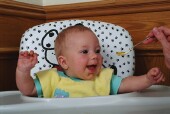- Are You Making This Expensive Thermostat Error This Winter?
- Recognizing the Signs of Hypothyroidism
- 10 Strategies to Overcome Insomnia
- Could Artificial Sweeteners Be Aging the Brain Faster?
- Techniques for Soothing Your Nervous System
- Does the Water in Your House Smell Funny? Here’s Why
- Can a Daily Dose of Apple Cider Vinegar Actually Aid Weight Loss?
- 6 Health Beverages That Can Actually Spike Your Blood Sugar
- Treatment Options for Social Anxiety Disorder
- Understanding the Connection Between Anxiety and Depression
Despite Media Companies’ Claims, Your Baby Can’t Learn to Read: Study


Read to your baby, sing and play games. But don’t waste money on programs that claim to teach infants to read, a new study suggests.
Researchers who explored this new twist on early learning effectively closed the book on the subject: “These children do not have the developmental capacity to learn how to read,” said Susan Neuman, the study’s lead author.
“They don’t understand that something on screen is representative of something in real life,” said Neuman, chairwoman of the teaching and learning department at New York University’s Steinhardt School of Culture, Education and Human Development.
Babies cannot read, agreed Frank Manis, a professor of psychology and education at the University of Southern California who studies reading and is familiar with the new research.
“[Babies] generally don’t understand narratives or stories until the age of 3 to 4,” he said, and they don’t acquire the skills to translate printed words into verbal words until the age of 4 or 5. “This means that children don’t generally learn to read simple books on their own with adequate understanding until the age of 5 to 6 years at the earliest,” Manis said.
Nevertheless, media companies have created a range of products that claim to teach babies as young as 3 months to read.
In the new study, published March 6 in the Journal of Educational Psychology, researchers randomly assigned 61 of 117 infants to a program called Your Baby Can Read, which included DVDs, flashcards and word books, for seven months. The babies were 9 to 18 months old. The other 56 infants didn’t do anything special.
When the researchers followed up, no differences between the two groups were apparent. As the study put it: “Results indicated that babies did not learn to read using baby media, despite some parents displaying great confidence in the program’s effectiveness.”
The makers of Your Baby Can Read contend that babies can pick up reading skills through its “multi-sensory and interactive approach to teach receptive, expressive and written language skills simultaneously during the child’s window of opportunity for learning language.”
Its manufacturer, a company called Your Baby Can, announced it was going out of business in 2012 amid complaints about the program’s effectiveness and a federal investigation prompted by critics of the “genius baby” industry. The program, however, still appears to be available for purchase.
Before concluding that the super-early reading claims are erroneous, the researchers used 14 measurements designed to pick up any fledgling reading skills, Neuman said. “We tried to be as generous as possible. We wanted to look at the full spectrum of reading abilities,” she said.
On the other hand, “we found no negative effects. The language of children was not retarded as a result of the program,” she said. Previous research has suggested that exposure to DVDs and videos could actually contribute to smaller vocabularies in babies, perhaps because they’re plopped in front of screens instead of interacting with people.
Manis said the study findings make sense. “It confirms what seems apparent to virtually every reading researcher, which is that babies generally do not learn to read from video learning products,” he said. “There is little point in trying to teach babies to read, as there is no long-term benefit.”
So what should parents do to encourage learning in their babies? Talk, sing and read with them, Neuman said.
Games can play a valuable role in learning, too. “There are some wonderful little learning games that are targeted to children’s development,” Neuman said. “You’ll see a lot of puzzle and shape games, stories told in lively ways to children that are highly engaging. Those things are fine.”
Even learning apps on computers are okay in moderation, she said.
More information
For reading activities for kids, see Reading Is Fundamental.
Source: HealthDay
Copyright © 2026 HealthDay. All rights reserved.










